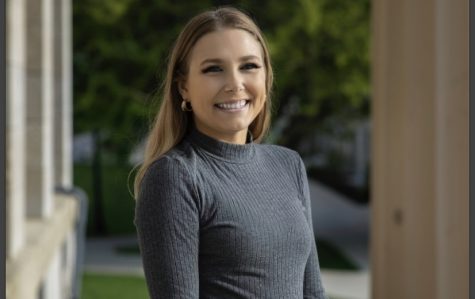Harreld says UIHC is confident in supply of personal protective equipment to resume elective procedures
UI President Bruce Harreld told the regents that UI leaders’ recommendation to Gov. Kim Reynolds to resume elective surgeries was based on its sufficient supply of necessary gear, rather than the $70 million financial toll on UIHC.
The University of Iowa Health Care building is seen on Wednesday, Oct. 1, 2015.
April 30, 2020
University of Iowa President Bruce Harreld defended Iowa Gov. Kim Reynold’s decision to
resume elective surgeries in the state beginning Monday, and spoke on the financial impact the purchase of personal protective equipment has had at UI Hospitals and Clinics at a state Board of Regents meeting Thursday.UIHC estimated a loss of $70 million as of this month, Harreld said, and continuing to postpone elective procedures would mean it could continue to see a loss of similar amounts in coming months.
“… We postponed them fully knowing that they would have potentially an impact on the patient, but we thought they could live with that issue for some period of time,” he said.
Harreld and other UI leaders were involved in Reynold’s decision to reinstate elective surgeries, and Reynolds stated at a Wednesday press conference that UI Vice President for Medical Affairs Brooks Jackson and other UI executives, including Harreld, had expressed that they felt UIHC was ready to resume elective surgeries and procedures.
“They made a case why they felt they were at a place, with responsible measures put in place, to bring back elective procedures,” Reynolds said Wednesday.
Harreld said Thursday that UIHC initially needed to cancel elective surgeries in order to avoid using the limited amount of personal protective equipment the hospital already had, and the decision was not made in an effort to free up space in the hospital for other patients.
Now, he said UIHC is confident in the amount of equipment it has for its health-care workers to safely perform procedures. The recommendation to Reynolds was made based on metrics not related to financials, such as the number of ventilators and available ICU beds.
“We fully knew there would be infinite fiscal impacts, but first and foremost was the issue of safety,” he said of the initial decision to cancel elective procedures.
Harreld said the health-care enterprise has also faced increased costs from UIHC purchases of large amounts of personal protective equipment, increased testing of patients for COVID-19, and planning for a potential surge of novel coronavirus patients.
“In this particular case we were changing [personal] protective equipment for every patient,” Harreld said. “When people walked through the door, we weren’t sure whether they were actually carrying the virus or not, so we had to assume that they did… Our volume of protective equipment just zoomed up.”















